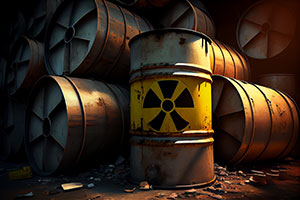 Last year, DAV was instrumental in ushering in a new era for toxic-exposure veterans benefits. While the Honoring our PACT Act transforms the lives of those reeling from some exposures, other veterans are still fighting for justice.
Last year, DAV was instrumental in ushering in a new era for toxic-exposure veterans benefits. While the Honoring our PACT Act transforms the lives of those reeling from some exposures, other veterans are still fighting for justice.
And DAV is in their corner.
Several new bills in Congress—all supported by DAV—would fill in the gaps left over from the PACT Act, which establishes more than 20 presumptive illnesses for burn pits and Agent Orange exposure.
“When the PACT Act was signed into law, DAV and the nation rightfully celebrated the monumental achievement, but we knew the work was far from over,” said DAV National Legislative Director Joy Ilem. “We must continue to fight to lift the undue burden off of the shoulders of all the ill and injured men and women who served. That’s exactly what these bills would do.”
The Veterans Exposed to Toxic (VET) PFAS Act (H.R. 4249/S. 2294) would require the Department of Veterans Affairs to expand health care and disability compensation to veterans exposed to so-called “forever chemicals,” per- and polyfluoroalkyl substances (PFAS), at military installations.
These companion bills direct the VA to establish service connection for illnesses related to PFAS chemical exposure. Several cancers, high cholesterol and pregnancy-induced hypertension have been linked to these toxic substances.
“We made a promise to those who signed up to serve our country that we’d take care of them and their families,” Rep. Dan Kildee of Michigan said in a statement introducing the bill in June. “This bill makes good on that promise by ensuring that all service members exposed to toxic chemicals as a part of their military service get the health care they need.”
Another hurdle in toxic-exposure recognition relates to radiation risk activities veterans have endured for decades. Before receiving the benefits they’ve earned, veterans are required to provide radiation dose estimates. The Providing Radiation Exposed Servicemembers Undisputed Medical Eligibility (PRESUME) Act (H.R. 4566) would remove this arbitrary requirement and bring the VA in line with similar federal government programs that lack this prerequisite, meaning that veterans wouldn’t be held to a higher standard than their civilian counterparts.
Likewise, in the days and months following the terrorist attacks on Sept. 11, 2001, American service members supporting military operations in Afghanistan were exposed to toxins at a remote air base in Uzbekistan. Karshi-Khanabad Air Base, also known as K2, contained a multitude of highly dangerous chemicals left over from the Soviet Union, including residuals from chemical weapons, jet fuel and radioactive depleted uranium, among nearly 400 other chemical compounds.
While the PACT Act includes K2 veterans for burn pit exposure, those exposed and sick from the other known chemicals are left out in the cold. That’s why DAV is pushing for legislation to be introduced expanding VA benefits to these veterans who have a 500% greater chance of developing certain cancers due to their toxic exposure. Follow along with updates to this and other legislation affecting veterans and their families by joining DAV CAN (Commander’s Action Network) at davcan.org.





